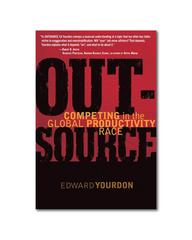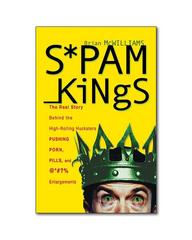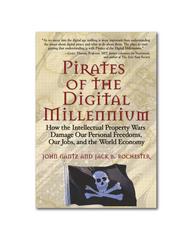
Book Reviews |

I thinks it's only fair to review a book with as little (if any) prior knowledge of other feedback, including the publisher's site and other on-line review portals. That said, I have never been as curious to see what others have said as I was after completing my review of Ed- ward Yourdon's book, Outsource.
This book contains a 227 page newspaper article. The interesting topic of outsourcing is a key subject in many fields, although this book focused heavily on IT-related jobs. The structure of the book is as elongated as its text, beginning with the basics of what causes outsourcing, then leading into what is happening in outsourcing today and the next decade. There is a chapter on other jobs affected by outsourcing, as well as a chapter on how outsourcing affects individuals. The book wraps up with what happens to companies and governments who outsource or that allow outsourcing. My initial reaction to the table of contents was early confusion. I couldn't decide who the author wanted to read this book. I still was looking forward to some education and technical data on the subject, however.
I've always figured that books existed either to educate or to entertain. This book did neither. Each chapter refers to data that supports Yourdon's dismal approach to the subject. His data, however, links to statistics and surveys based on fewer than 100 participants. There is no information about the pool of participants, nor any evidence of an attempt to diversify the reports and graphs or the participants themselves. Every paragraph of every chapter redundantly referred to the objective of the prior chapter, for no obvious reason. The writer's style of reiterating words, and his overuse of alliteration and first person point of view, made reading this book even more irritating than the lack of depth in the factual content.
I can't decide if this book is supposed to scare people, or if it is just supposed to be a platform for the author to talk about himself and his prior works. Regardless, I've always mentioned something positive that I find in a book (nothing is ALL bad, right?).
So, for this book, I'll commend two things: first, the interesting collection of quotes included from various sources I'd never have read otherwise, and second, the 6-inch pages, which make the book an easy single-sitting read.
Edward Yourdon
272 pages
Prentice Hall, 0-13-147571-1
£ 22.50, US$ 27.99, EUR 23.90

As I continue to examine some recent computer books that may be interes- ting for non-technical readers, Brian McWilliams' title, Spam Kings is a great find. Few people old enough to read are unaffected by spam today, and while there is much information about sorting or creating your own spam, I've never seen anything that addressed the human side of the problem.
This book consists of anecdotes describing the spam insiders who have affected the lives of everyone in the world who owns an email address today. This book is really several biographies in one. The author has managed to share details of the spam kings' lives that leave you wondering if there is indeed only a single author of this book, and if so, what else has he written that you can read next?
The diversity of the characters McWilliams introduces in the book is very entertaining, and his writing style is comparable to your favorite novel. You're able to immediately im-merse yourself in- to the story line without significant prior studying. If you want to learn how to spam, why you should spam, or how to prevent it, don't pick up this book. If you'd like to know more than that, however, I think it's a worthy read. I'll be sharing this one with some of my non-technical family members this holiday season in hopes it will answer some of their ongoing questions about the who, what, and why of spam.
Brian McWilliams
368 pages
O'Reilly, 0-596-00732-9
£ 15.95, US$ 22.95,
EUR 22.00

Informative, well-structured, and simply accurate are adjectives I'd use to describe the overall quality of the book, Pirates of the Digital Millennium. Authors John Gantz and Jack B. Rochester did a very thorough job of documenting the issues surrounding piracy that are of interest to non-technical readers.
This book does not go into the technical details of piracy software or the methods of pirates. I believe more technical readers (such as the readers of this magazine) may be disappointed not to find more information related to their fields or causes in this book. I'll save you from searching by saying there is no mention of anything about Open Source or any examples of OS theories in Pirates of the Digital Millennium.
That said, I think publisher Prentice Hall has produced another title worthy of adding to a reference library. The authors wade through several facets of piracy, starting with defining a pirate and ending with predictions of the future profitability of any business affected by pirating. Sandwiched in the middle are several examples of technology piracy, focusing primarily on the music industry, with a few highlights of software issues.
I won't say that this book has an agenda, but I was disappointed at the narrow focus on the loss of profit from piracy. Readers of this book are likely already scared of licenses and copyrights, and this book will only contribute to that fear. It is already difficult to explain to new people how Open Source handles intellectual property, and how the Open Source model can be profitable, without books such as this one contributing to scattering the cat herd even further.
But to sum up my impressions, Pirates of the Digital Millennium is definitely a high quality book that takes a thorough look at piracy. how piracy affects music-downloading listeners, and the how the music and high tech industries are changing because of the practices of pirates.
John Gants and Jack B. Rochester
320 pages
Prentice Hall, 0-13-146315-2
£ 17.99, US$ 25.95, EUR 22.50